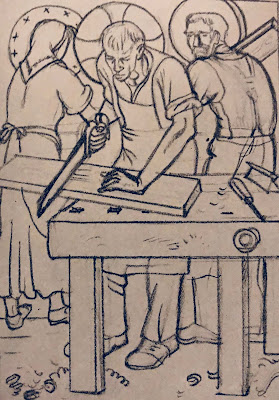I was delighted to celebrate Christmas at Our Lady of the Annunciation Parish in Queensbury, New York, where I preached this homily.
In the beginning it was very dark. Nothing but dark and bubbling chaos beneath the deep…and God said “Let there be light” and vegetation grew from the cold black dirt, while waters bubbled from dry ground and little creatures began to crawl on their bellies…and God breathed into the dirt, saying “Let their be light,” and the first of our kind walked and loved and saw the light. And it was very good.
As in the fulness of time on that first Christmas night, when it was so very dark.
Shepherds, scared and trembling, exiled to the night watch of their flock, ‘midst all kinds of fearful visions and phantasms wandering afraid amidst desolate hills. While three lost men from far away on camels, wandered hither and yon seeking for a King to guide them, and desperate for a star.
And perhaps it was darkest of all for a young girl on a donkey, heavy with child and the old man lumbering beside her wandering the dirt path of a strange town, desperate for a place to rest their baby on the verge of birth. They were a people walking in darkness, aching to be saved from a millenia of desperation, as prophets cried in the wilderness to a God they feared would never come.
And then it happened. They saw the child who is love and light and truth who came to save them, and to save us as well.
Like us, tonight. For it is very dark outside. Dark with the tyranny of the cold, bleak hatred of the truth, the propagation of the lie, embracing gladly the dark blindness of ignorance, refusing to forgive, with hope in short supply. My God, how dark it gets!
For the mother who can’t feed her child who cries softly tonight, it is very dark. For the young man, afraid of the sin that is slowly taking over his life, overwhelmed and ashamed by deeds of darkness who cries softly tonight, it is very dark.
For the teacher across the street whose brother and sister died from a needle full of heroin who cries softly tonight, it is very dark.
For the old woman whom no one has come to see this Christmas eve afraid that soon she will die alone who cries softly tonight, it is very dark.
For the parent who has been abandoned with a child in her arms,
alone and afraid, with no idea how she can do it who cries softly tonight, it is very dark.
For the girl who sits in her car across from the abortion clinic and imagines what it is like inside contemplating the darkest of deeds
with fear and desperation who cries softly, it is very dark.
For the guy who no longer believes and whose sole and fervent hope is to escape it all in a bottle, a needle or a pill who cries softly tonight, it is very dark.
For they are tempted and very much afraid, that the last small glimmer of the setting sun in their lives will fade and that the darkness will overcome it all.
But then they catch sight of it, and at first it is barely a glimmer: a barely perceptible twinkle of light, a promise of something to guide them.
So they follow this guiding star, hesitantly at first, which leads them to the unapproachable light. And basking here in the warmth of the Christ, the cold dark fear begins to go away, knowing the Babe who did not cling to his power as God, has been born for them.
That’s why, in here, we see the twinkling of little lights. For ‘a people who walked in darkness have see a great light,’ and he is is Christ the Lord, the Light through whom we were made who has taught us how to hope.
No darkness is so dark that he cannot shatter it.
No sinner so evil that he cannot forgive.
No fear so overwhelming that he cannot quench it.
No desperation so deep that he cannot lead us home.
He is not a cute story, or a fond or cuddly legend, He is the Christ, who giggled in a manger beneath a star crucified on a cross when the sun went black. Who wept by a grave and rose from the dead. Who heals us of blindness and commands us to love. Who is, who was and who is to come. He is the reason for our being our life, our love and our only hope.
So come to Church, and let us sing those ancient songs and hear the wondrous story yet again. And gaze at the twinkling of those little lights, for we need never, ever fear the dark again.



